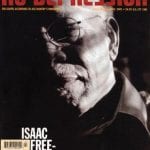Caitlin Cary – Dark horse
Most everyone who saw Whiskeytown back then has a story, about how the band played one of the best or worst or weirdest shows they ever saw. Adams and original guitarist Phil Wandscher were often at odds, leading to the latter’s departure in 1997 in the middle of the Strangers Almanac tour (which Adams and Cary finished as a duo). The lineup turned into a revolving door, and Cary grew frustrated with how many shows turned into confrontational performance-art brawls.
“Typically, one-third of the shows were superb, one-third sucked and one-third were some memorable punk thing Caitlin wanted nothing to do with,” recalls Thomas O’Keefe, Whiskeytown’s road manager for most of that era. “Her objective and Ryan’s objective were two different things. She always understood that the kids who’d paid their seven bucks deserved to get a good show, where Ryan was always turning south and trying to crash the thing. She didn’t very much want to be part of that — when he’d smash things and lay on the floor making noise for 20 minutes — and would often just walk off.”
Cary retains enormous fondness for Adams, and says that watching him play on Saturday Night Live in November was like watching her little brother. She also says that if the phone rang and it was Adams wanting to record again, “I’d go running.” But being his bandmate on the road was rough at times.
“The thing about Ryan is that he’s the most amazing justifier I’ve ever known,” she says. “He would do something to piss me off, throw a show or whatever; and he would have some excuse or reason that would actually make me think, ‘Well…OK, maybe that was the right thing to do.’
“I always felt we should try to do a great show every time, and Thomas used to get furious at Ryan: ‘Do you have any idea how lucky you are? That people pay to come hear these songs you wrote on a fucking bar napkin?!’ But Ryan always had some punk-rock thing he could use to explain everything.”
Given the band’s volatility, it’s amazing Whiskeytown managed to put out records at all, let alone great ones. Cary recalls their 1997 magnum opus Strangers Almanac as particularly difficult, starting with the first time the band gathered to play the material for producer Jim Scott.
“Ryan was being a real brat, throwing in lots of Stones licks,” she says. “And I just remember the look of terror on Jim Scott’s face. He told us this wasn’t gonna fly, and actually left for a day: ‘Work this shit out, and I’ll come back when you’re playing better.’ It’s a miracle that record came out the way it did. I was recently able to play it for the first time since then, and yeah, it is incredible.”
In the studio, at least, the Ethan Johns-produced follow-up Pneumonia came easier. Complications ensued after Universal and PolyGram merged, dissolving Whiskeytown’s label Outpost Records before Pneumonia could be released. The album languished for nearly two years, although enough bootleg copies slipped out that it gained a reputation as a lost masterpiece.
By the time Pneumonia finally came out, in May 2001 on the new imprint Lost Highway (which had also signed Adams to a solo deal), Whiskeytown no longer existed — and in a sense, neither did Pneumonia. Before its release, Adams and Johns went back and did some tinkering, remixing the tracks in an attempt to give the album a more organic feel than the version that had been in circulation. They also altered the song selection, dropping one of the album’s best tracks (“Choked Up”, which was covered by pop band Minibar on their debut disc before Pneumonia even made it to the record racks).
No one else in Whiskeytown had input on the remixing, but Cary didn’t mind. “At that point, I was ready to let it go,” she says. “I was proud of Ryan for having the tenacity to stick with it, and he and Ethan were going for something they weren’t hearing on that other version.
“Remember, that was supposed to be our ‘huge’ record where we made back all our money, and I felt like the songs justified the polish that had been put on them. But that’s just a question of one vision versus another. Nothing wrong with trying, even though I thought it suffered a bit.”
In the wake of Whiskeytown’s demise — their final show was a haphazard appearance at Raleigh’s erstwhile Lakeside Lounge in September 2000 that was booked the day before the gig — the principals moved on. Adams released a solo debut on Bloodshot, Heartbreaker, setting the stage for his mainstream breakthrough in 2001 with Gold, which garnered a couple of Grammy nominations. Guitarist Mike Daly did session work with Alejandro Escovedo and Robert McCreedy, among others, and worked on his own songwriting.
Daly also solidified a writing partnership with Cary. The two began working with Chris Stamey as part of a loose stable including Tres Chicas (Cary’s band with Glory Fountain’s Lynn Blakey and Hazeldine’s Tonya Lamm) and up-and-coming country singer Thad Cockrell. They all recorded together, singing and playing on each other’s records with extraordinary results.




